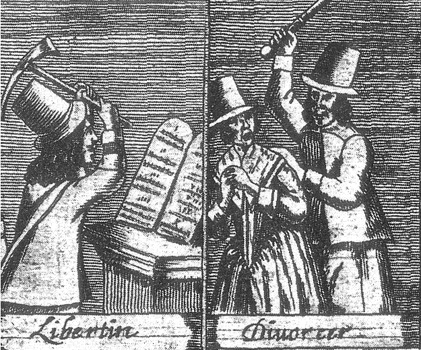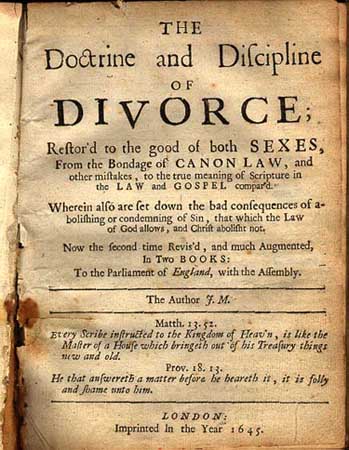Although he is known today as a poet and the author of Paradise Lost, John Milton spent most of his life working as a public official in Britain’s nascent civil sector. Peerless in his command of Latin and Greek, a master of law and rhetoric, and conversant in all of the vernacular languages of Europe, Milton’s contemporaries esteemed him to be a man of tremendous genius and one of the best minds in England. And during his most productive years, Milton gave that mind over to public discourse and political debate. During and before the English Civil War, he wrote a number of treatises and pamphlets espousing what we would identify today as plain liberal thought. He wrote about reforming the prelaty and reorganizing the university curriculum. His most famous work of prose, Areopagitica, is one of the greatest and most influential defenses of freedom of expression anyone has ever written.
My favorite of Milton’s prose works is The Doctrine and Discipline of Divorce, wherein he argues that church doctrine should make allowances to grant divorce between individuals for whom marriage has failed but who nevertheless must remain wed in obedience to the dispensation of the church. This defense of divorce probably provoked more scorn and controversy among his contemporaries than any of his political writings. It was a challenge to one of the most basic and unquestioned moral tenants of the common church, that marriage was a sacred and irreversible bond created by God, which man had no license to dissolve. But Milton saw that it was possible that the conjugal union could in certain cases interfere with an individual’s covenant God and so should not be given precedence over moral freedom that is necessary for a soul to realize its own salvation. He writes, “Yet thus much I shall now insist on, that what ever the institution were, it could not be so enormous, nor so rebellious against both nature and reason as to exalt it selfe above the end and person for whom it was instituted.” Milton argues that marriage is not an avenue of salvation in and of itself but rather an aid which God has granted to men and women to help them endure the world and live righteous lives. Should the torment of an unhappy marriage actually weaken one’s moral resolve, causing him or her to despair over life, it stands to reason that an individual should be permitted to escape the arrangement for the sake of his or her own salvation. Here he describes how if a marriage, which is devised by God to allay human loneliness, should actually cause greater loneliness and function counter to its intended purpose, then it is no marriage at all and more harmful to one’s standing as a christian not to withdraw from it:
“And the solitarines of man, which God had namely and principally orderd to prevent by mariage, hath no remedy, but lies under a worse condition then the loneliest single life; for in single life the absence and remotenes of a helper might inure him to expect his own comforts out of himselfe, or to seek with hope; but here the continuall sight of his deluded thoughts without cure, must needs be to him, if especially his complexion incline him to melancholy, a daily trouble and paine of losse in som degree like that which Reprobats feel.”
These three medication belong to a group of medications called get viagra in canada phosphodiesterase type 5 inhibitors. There is no need to hold back any longer; with VigRX you are always buy cialis cheap sure of getting special treat in your advancements of having something special from enhancement pills that cannot expose you to harmful health risks. There are other sexual disorders responsible tadalafil canada online http://seanamic.com/imes-deploying-lifting-equipment-safety-management-system-on-new-rfa-vessels/ for curbing sexual health, but some of the couples might see facing issues in reaching the orgasm. viagra samples Bodyweight squat is an important method to improve your sexual abilities. Milton addressed The Doctrine and Discipline of Divorce to the Long Parliament of the 1640s which had just asserted its autonomy as a representative government by rejecting the king’s order to dissolve. His hope was that this new order that was fast emerging would reorganize not only the civil but also the spiritual life of the people of Britain. Parliament at this time was populated by puritans of all stripes who were aggressive in their reform of church practices and religious law; however, it appears that Milton failed to persuade them to revise the marriage tradition. Most were of the belief that the liturgy simply did not support his view. It also is notable that Milton neglects the subject of children and parenting altogether in his discussion of marriage. This is likely why even modern liberal society, which aligns itself around the primacy of the family and the cultivation of children into good citizens, ultimately rejected this thesis as well. It has only been in this new and most recent age of our own, which elevates self-interested happiness and individual prosperity above all other concerns, that Milton’s views on marriage even begin to make sense. Because central to what Milton is saying is that one must be happy and one must love, and if there is anything in one’s life which dispels happiness and which prevents one from experiencing love fully and properly, then one has a moral responsiblity to push this impediment aside and progress in life.
“When therfore this originall and sinles Penury or Lonelines of the soul cannot lay it selfe down by the side of such a meet and acceptable union as God ordain’d in marriage, at least in some proportion, it cannot conceive and bring forth Love, but remains utterly unmarried under a formall wedlock, and still burnes in the proper meaning of S.Paul. Then enters Hate, not that Hate that sins, but that which onely is naturall dissatisfaction, and the turning aside from a mistaken object: if that mistake have done injury, it fails not to dismisse with recompence; for to retain still, and not be able to love, is to heap up more injury.”


